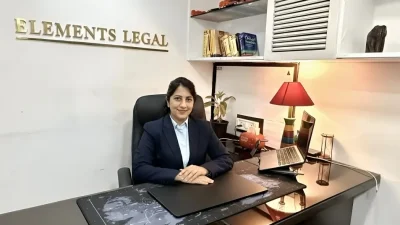Founder
2132
0
0
“Spending hours in a counsel’s chamber helps you develop a unique relationship with each counsel, learn their craft, and eventually shape your own style of argument.” – Sanchari Chakroborty, Founder and Partner at SC&A Legal
This interview was taken by SuperLawyer Team
Posted on June 05, 2024
This interview has been published by Namrata Singh and The SuperLawyer Team

Reflecting on your journey from your early days, could you share what inspired you to pursue a career in law? Additionally, what were some of the challenges you encountered during your initial days in the legal profession, and how did you overcome them to carve your path to success?
Looking back, I can’t claim to have been an exceptional student in school or college. I couldn’t take my studies very seriously and often missed classes due to chronic asthma. My long absence from classes owing to my health conditions made it challenging to keep up with my studies. As I grew older and my health improved, my academic focus increased.
I pursued humanities instead of science because of my health issues, and my parents never pressured me academically. Despite my humanities background, I always wanted to pursue a professional course. In 2004, during school counseling, I was introduced to the idea of a career in law. The growing importance of corporate law and the growing diverse role of lawyers made this path even more appealing.
Around 2004 and 2005, the changing landscape in the Indian industry and the shift in macroeconomics globally led me to consider law as a career. Furthermore my personal experiences with family legal issues highlighted the need for proper legal guidance and the challenges faced by the common man. This motivated me to specialize in litigation.
Starting my legal practice was challenging since I came from a family with no lawyers. I realized I had to actively seek opportunities rather than wait for them. I conducted research online to begin my journey. I listed around 10 to 15 law firms in Kolkata to approach driven by my anxiety before our final exams. Coming from a state university and with no guidance in this filed, starting a career in litigation can be befuddling.
Alarmed by the situation, I realized it was time to take action. I started knocking on the doors of various law firms, forwarding my CV, and requesting internship opportunities. Among the 14 to 15 firms I approached, one offered me a full-time internship for a month or two in the year 2009.
I wanted to start with District courts since most litigations in India take place there. I took two months of training in the district courts of West Bengal. In August or September of 2009, I secured an internship at Victor Moses & Co. a reputed law firm in Kolkata, where I would eventually spend seven years and assist the Senior-Most Partner, Mr. D.N.Mitra, who had been a great force behind me always.
The initial challenge, as a first-generation lawyer, was turning the internship into a job opportunity. It’s crucial for young interns to understand that internships are the chance to demonstrate interest, perseverance, and resilience. During my internship, I sought out work, often staying until 7:30 or 8:00 PM, sometimes even later. It was about becoming an integral part of the firm and getting involved in important projects. This approach turned my internship into an opportunity to work in that Firm.
As by litigation practice commenced, one of the most initial challenges we encountered revolved around timing. We had to attend late night conferences for the next day matters which often started at 10 .00 PM at the night and went on till late. The absence of modern conveniences such as Uber or Ola, coupled with the lack of a family vehicle, rendered late-night commutes a formidable task. Nevertheless, confronting these adversities served to fortify our resolve. Presently, the advent of technology and the prevalence of virtual conferences (VC) have considerably alleviated such difficulties. In fact Virtual Platform has become the norm today for late night conferences, however, during our time, such luxuries were non-existent, thereby instilling within us a profound appreciation for industriousness.
Carrying physical copies of briefs, sometimes 10 to 12 volumes, and multiple books was another challenge. Nowadays, an iPad can hold all the necessary documents, but back then, it wasn’t an option. But I feel these experiences made us tougher and erased any fear of hard work. The challenges we faced then make current tasks seem easier by comparison.
Another advantage of those early days was building unique relationships with each counsel and their juniors and clerks in the chambers. Spending hours in a counsel’s chamber allowed us to learn closely from their unique styles of argument and advocacy. This exposure to various schools of advocacy became a foundational stone for later success. It helped in developing my own skillset and the methods that my firm now uses in litigation.
The initial grind in the litigation industry is a preparation phase that tests resilience and determination, which are essential for surviving in a dispute resolution profession. Once you pass through this phase, it becomes a journey of continual progress.
As a member of various prestigious institutions like the Confederation of Indian Industry (CII) and Indian Women Network (IWN), how do you think being part of such networks has influenced your professional growth and the growth of SC&A Legal?
As a lawyer and the founder of a law firm specializing in commercial litigation, staying updated on emerging policies, industry news, and trends is crucial. We must also understand new rules, regulations, and their economic rationale to guide our clients proactively. The Confederation of Indian Industry (CII) plays a significant role, offering a platform for lawyers to engage with key stakeholders across various industries. CII organizes events, conferences, and seminars, facilitating meaningful discussions with business leaders, policymakers, and fellow professionals, which fosters collaboration and knowledge exchange. Additionally, CII’s research reports and policy advocacy efforts keep us informed about emerging trends, regulatory developments, and business opportunities. This enables us to better serve our clients and stay ahead in a dynamic business environment. CII has significantly contributed to our professional growth, helped SCA expand its client base, and kept us updated on industry-specific challenges and opportunities.
Furthermore, the Indian Women Network (IWN) wing of the CII has been instrumental in connecting me with inspiring women leaders who make exceptional contributions across various industries. As an entrepreneur, facing isolation in your growth path is common, and during such times, support from a community of motivators and inspirers is invaluable. Under the leadership of Sujata Guin, Senior VP of Apeejay Surrendra Park Hotels Limited, and Smita Chatterjee, CEO of Centreax, IWN is reaching new heights and positively influencing many lives.
SC&A Legal specializes in dispute resolution. How does your firm differentiate itself in this competitive landscape, and what unique strategies do you employ to ensure client satisfaction?
SC&A Legal believes that the first step in serving our clients is identifying potential disputes because litigation does not begin in the courtroom. It starts in your office, from the moment the seeds of litigation are sown, such as when you enter into a contract, a commercial transaction, or a deal. As specialists in commercial litigation, SC&A Legal’s uniqueness lies in our strategic partnership with clients. We advise them at every step, helping to build their case even when they haven’t yet identified the disputes. Our expertise and leadership in the industry allow us to recognize the early signs of potential conflicts.
The sooner you identify potential disputes or causes of action, the easier and more effectively you can resolve them. We do not view litigation as an end in itself but as one of many strategies to resolve disputes. Whether through conventional litigation, mediation, or arbitration, our goal is also to give you a stronger bargaining position and achieve better settlements or deals in commercial matters which can be resolved without always burdening the Courts or waiting for the entire litigation span to be over.
At SC&A, we prioritize complete transparency in our strategies. From day one, we plan the end game with our clients, providing clear information about timelines and costs. Our primary aim is to deliver cost-effective and timely resolutions to our clients’ disputes.
With offices in Kolkata, Delhi, and Bhubaneswar, how do you ensure seamless coordination and communication among your team members across different locations, especially in the context of complex legal cases?
I would like to express my gratitude for the advancements in technology and the global acceptance of video conferencing and virtual platforms, especially after COVID. This shift has greatly facilitated seamless handling and coordination among our three offices. Whether dealing with courts, clients, or councils, everyone has become increasingly comfortable with virtual platforms.
We have conducted numerous arbitrations across various forums and cities in India and abroad using these platforms. Even arbitrators are now more open to holding witness sessions virtually. The litigation industry has experienced significant benefits from technological growth, allowing lawyers to manage multiple offices, litigations, and dispute resolution projects with ease and complete coordination.
With your involvement in the Incorporated Law Society of Kolkata, how do you contribute to aspiring lawyers’ legal education and professional development? Are there any initiatives or mentorship programs you’re particularly passionate about?
As a member of the Incorporated Law Society of Kolkata, I actively participate in various initiatives aimed at enhancing legal education and professional development for aspiring lawyers. This involvement not only contributes to the growth of the legal community but also fulfills my passion for encouraging new talents to join the fields of litigation and dispute resolution.
With your background in real estate and infrastructure law, how do you foresee the legal implications of future urban development projects, especially in the context of sustainable growth and environmental conservation?
Future urban development projects will likely face increased scrutiny and regulation concerning sustainability and environmental conservation. As awareness of climate change and environmental issues grows, there will be a stronger emphasis on integrating sustainable practices into urban planning and development.
From a legal perspective, this implies stricter compliance requirements related to environmental impact assessments, zoning regulations, land use planning, and building codes. Lawyers specializing in real estate and infrastructure law must stay updated on evolving environmental legislation and regulations to ensure their clients’ projects meet these standards.
Additionally, a greater focus will likely be on incorporating renewable energy sources, green building technologies, and eco-friendly design principles into urban development projects. Lawyers will play a crucial role in negotiating contracts, securing permits, and navigating regulatory frameworks to facilitate the implementation of sustainable practices.
Furthermore, legal challenges and disputes may arise from conflicts between development interests and environmental conservation efforts. Lawyers will need to provide strategic advice and advocacy to resolve these conflicts while balancing the need for economic development with environmental protection.
As a woman leader in the legal industry, how do you advocate for gender diversity and inclusion within your firm and the broader legal community? What strategies do you employ to ensure equal opportunities for all professionals regardless of gender?
As a leader, I firmly believe that actions speak louder than words. Therefore, we actively encourage our female associates and team members to assume pivotal roles within our firm. We strive to provide them with a flexible environment that allows them to maintain a balance between their professional responsibilities and personal lives, while also ensuring they remain motivated to look forward
Our female associates are remarkable advocates when it comes to representing our clients. We not only encourage them to engage in vigorous argumentation and advocacy before various competent forums, but they consistently deliver outstanding performances in these arenas.
In your experience, how does cultural diversity impact dispute resolution, especially in cases involving multinational clients? Could you share a memorable cross-cultural negotiation experience and the valuable insights gained from it?
Cultural diversity holds considerable sway over the course of dispute resolution, particularly in scenarios involving multinational clientele, as it inherently shapes communication dynamics, negotiation strategies, and conflict resolution methodologies. The comprehension and adept navigation of these cultural nuances stand as imperative prerequisites for achieving efficacious dispute resolution.
To surmount these cultural disparities and foster a fruitful negotiation environment, it is paramount to engage in the process with a blend of sensitivity and adaptability. Typically, in these cross-border negotiations, we invest the necessary time to grasp the cultural heritage, communication predilections, and underlying motivations of each involved party. Furthermore, we employ an array of techniques, including active listening, reframing issues through a culturally attuned lens, and seeking common ground, all aimed at cultivating trust and rapport amidst the negotiating factions.
Through the virtues of patience, empathy, and a readiness to tailor our negotiation methodologies to accommodate cultural variances, we have consistently achieved mutually beneficial resolutions that effectively address the interests and apprehensions of all involved parties.
With the demanding nature of your profession, how do you unwind and maintain a work-life balance? Could you share some of your favorite ways to relax and recharge outside of your legal endeavors?
As my years of experience have accumulated, I’ve come to appreciate the significance of practicing detachment in both personal and professional spheres as a means to fostering a balanced life. When engrossed in litigation or a project, dedicating undivided attention and focus is imperative. However, upon its conclusion, regardless of the outcome’s favorability, it’s essential to gracefully transition forward. Recognizing that life is an ongoing journey, we must refrain from being swept away by triumphs or dwelling on setbacks. Each new day presents fresh challenges to conquer.
Moreover, it’s crucial to incorporate periodic breaks, during which one can fully disconnect from professional obligations and engage in pursuits unrelated to work. This allows for the replenishment of energy and enthusiasm, enabling us to approach tasks with renewed vigor each time.
Given your journey from a young professional to founding SC&A Legal, what advice or key points would you share with students and young professionals who are just starting their careers in the legal field?
My first advice to every young law graduate would be to definitely garner experience in a dispute resolution law firm, as that will give you a deeper understanding of various streams of law and thus build a strong foundation for a lifetime. Secondly, never give up on yourself. The legal profession will also give you back your rewards; it’s just a matter of time. Have faith and patience; you will succeed.
Get in touch with Sanchari Chakroborty-







No comments yet
Be the first to share your thoughts about this interview.